新目标英语九年级第一单元U1-3语法知识点概括
新版新目标英语九年级unit1知识点总结
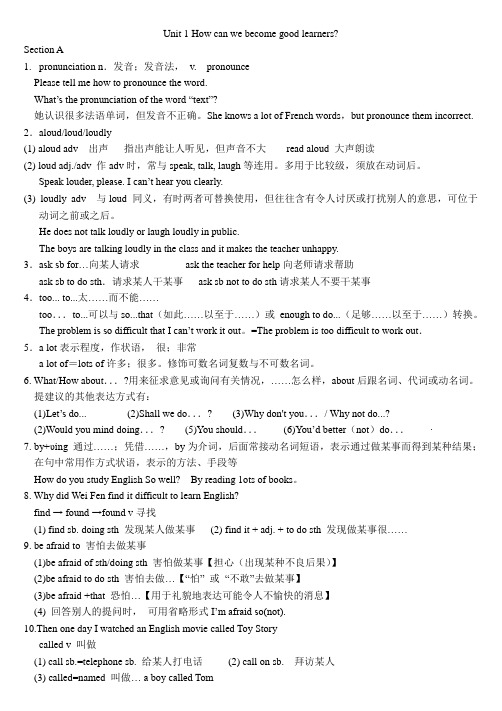
Unit 1 How can we become good learners?Section A1.pronunciation n.发音;发音法,v. pronouncePlease tell me how to pronounce the word.What’s the pronunciation of the word “text”?她认识很多法语单词,但发音不正确。
She knows a lot of French words,but pronounce them incorrect. 2.aloud/loud/loudly(1) aloud adv 出声指出声能让人听见,但声音不大read aloud 大声朗读(2) loud adj./adv 作adv时,常与speak, talk, laugh等连用。
多用于比较级,须放在动词后。
Speak louder, please. I can’t hear you clearly.(3) loudly adv 与loud 同义,有时两者可替换使用,但往往含有令人讨厌或打扰别人的意思,可位于动词之前或之后。
He does not talk loudly or laugh loudly in public.The boys are talking loudly in the class and it makes the teacher unhappy.3.a sk sb for…向某人请求ask the teacher for help向老师请求帮助ask sb to do sth.请求某人干某事ask sb not to do sth请求某人不要干某事4.too... to...太……而不能……too...to...可以与so...that(如此……以至于……)或enough to do...(足够……以至于……)转换。
The problem is so difficult that I can’t work it out。
九年级英语Unit1-Unit12知识汇总人教新目标版概要

九年级英语Unit1-Unit12知识汇总Unit11. by + doing通过……方式如:by studying with a group2. talk about 谈论,议论,讨论talk to sb. === talk with sb. 与某人说话3.ask for…要求,寻求4.read aloud朗读5.spoken/written English英语口语/书面英语6.be afraid of…害怕…be afraid to do sth.害怕做…7. not …at all 一点也不根本不8. be / get excited about s对…感兴奋9. ①end up doing sth 终止做某事,结束做某事②end up with sth. 以…结束10. first of all 首先. to begin with 一开始later on 后来、随后11.have trouble doing sth.做某事费劲/困难12. make mistakes in(在…方面)犯错13. laugh at sb. 笑话;取笑(某人)14. take notes 做笔记,做记录15. enjoy doing sth .喜欢做enjoy oneself 过得愉快16.look up查阅,look for寻找, look after照顾,look at看, have a look at看一看, looklike看起来像,look over(医生)检查17. make up 组成、构成20. practice doing 练习做某事21. decide to do sth.=make a decision to do sth. 决定做某事25. be angry with sb. 对某人生气26.for long= for a long time(长时间)27. go by (时间) 过去28. see sb. / sth. doing看见某人正在做某事强调正在发生see sb. / sth. do看见某人在做某事如: She saw him drawing a picture in the classroom.她看见他正在教室里画画。
九年级英语上册各单元知识点归纳

九年级英语上册各单元知识点归纳第一单元:基础知识1. 介词短语的使用:介词短语是由一个介词和它的宾语组成的短语,用来表示时间、地点、方向、原因等。
例如:"on the table"(在桌子上),"in the park"(在公园里)。
介词短语在句子中作状语、定语、宾语等。
需要注意介词与宾语之间的搭配。
2. 动词的时态和语态:英语中的动词有多种时态和语态。
常见的时态有一般现在时、一般过去时、一般将来时等。
常见的语态有主动语态和被动语态。
时态用于表示动作发生的时间,语态用于表示动作的执行者。
例如:"She is reading a book."(她正在读一本书)。
需要注意时态和语态的用法和变化规则。
3. 名词的单复数形式:英语中的名词有单数和复数形式。
复数形式一般是在名词后面加-s或-es。
有些名词的复数形式较特殊,需要记忆。
例如:"a cat"(一只猫)的复数形式是"cats"(多只猫)。
需要注意名词的单复数形式在句子中的搭配和用法。
第二单元:阅读理解1. 完型填空:完型填空是一种考察学生对语境理解和词汇运用能力的题型。
在完型填空中,通常给出一篇文章和一些空格,要求学生根据文章内容和语境选择正确的单词或短语填入空格中。
通常需要结合文章整体逻辑和上下文意义来填写正确答案。
2. 阅读理解题:阅读理解题是一种考察学生阅读理解能力和推理能力的题型。
通常会给出一篇短文或文章,然后根据文章内容提出一些问题,要求学生根据文章内容和推理来回答问题。
需要学会熟练阅读和理解文章,抓住关键信息和主题,并能运用推理等能力来回答问题。
第三单元:语法知识1. 直接引语和间接引语:在英语中,当我们引述别人的话时,可以使用直接引语和间接引语。
直接引语是直接引用别人所说的话,使用引号将其包围;间接引语是将别人所说的话转述出来。
例如:直接引语:"I am happy," she said.(她说:“我很开心。
九年级英语unit1知识点梳理

九年级英语unit1知识点梳理九年级英语Unit 1 知识点梳理Unit 1是九年级英语中的重要单元,主要介绍了一些基础的英语知识点,如情态动词、被动语态、现在完成时等。
本文将对Unit 1的知识点进行梳理和总结,帮助同学们更好地掌握这些内容。
情态动词情态动词是英语中的一类特殊动词,包括can、could、may、might、will、would、shall、should、must等。
它们用来表示谓语动词的情感色彩、说话者的语气态度或对事物的态度。
情态动词的用法比较灵活,可以用于各种时态和语气。
在句子中,情态动词通常与动词原形搭配使用。
被动语态被动语态是英语中的一种句子结构,用于表示主语是动作的承受者,而不是执行者。
被动语态的结构为“be + 过去分词”,其中“be”根据时态的不同可以是am、is、are、was、were等。
被动语态的使用可以强调动作的承受者,也可以将执行者放在句子后面,使表达更加灵活。
现在完成时现在完成时表示过去发生的动作对现在产生的影响或结果。
它的基本结构为“have/has + 过去分词”,其中“have”用于第一人称和第二人称,而“has”用于第三人称。
现在完成时常与时间状语连用,如just、already、yet、ever、never等。
冠词的用法冠词是用于限定名词的词语,包括定冠词“the”和不定冠词“a/an”。
在特指某一个事物或人时使用定冠词“the”,而在泛指一类事物或人时使用不定冠词“a/an”。
动词的时态动词的时态表示动作发生的时间,包括一般现在时、一般过去时、一般将来时等。
一般现在时表示经常发生或普遍存在的动作、状态或习惯;一般过去时表示过去某个时间发生的动作;一般将来时表示将来要发生的动作或情况。
连词的用法连词是用于连接词语、短语或句子的词语,包括并列连词、从属连词和相对连词。
并列连词如and、but、or用于连接同等重要的词语或句子;从属连词如because、if、unless用于引导从句;相对连词如who、which、whose用于引导定语从句。
九年级上册英语u1t3知识点
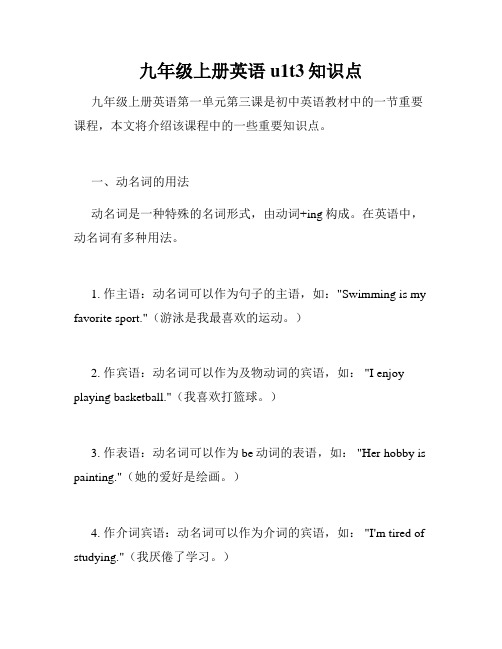
九年级上册英语u1t3知识点九年级上册英语第一单元第三课是初中英语教材中的一节重要课程,本文将介绍该课程中的一些重要知识点。
一、动名词的用法动名词是一种特殊的名词形式,由动词+ing构成。
在英语中,动名词有多种用法。
1. 作主语:动名词可以作为句子的主语,如:"Swimming is my favorite sport."(游泳是我最喜欢的运动。
)2. 作宾语:动名词可以作为及物动词的宾语,如: "I enjoy playing basketball."(我喜欢打篮球。
)3. 作表语:动名词可以作为be动词的表语,如: "Her hobby is painting."(她的爱好是绘画。
)4. 作介词宾语:动名词可以作为介词的宾语,如: "I'm tired of studying."(我厌倦了学习。
)5. 作状语:动名词可以作为动词的状语,如: "He went home, singing happily."(他唱着快乐地回家了。
)二、动词不定式的用法动词不定式是由to+动词原形构成的,也具有多种用法。
1. 作为宾语:动词不定式可以作为及物动词的宾语,如: "I want to visit my grandparents."(我想去看望我的祖父母。
)2. 作为目的状语:动词不定式可以表示一个目的状语,如:"I'm here to help you."(我来这里是为了帮助你。
)3. 作为结果状语:动词不定式可以表示一个结果状语,如:"He studied hard to pass the exam."(他努力学习以通过考试。
)4. 作为形容词补语:动词不定式可以作为形容词的补语,如:"I'm happy to see you."(见到你我很高兴。
九年级Unit1-3重点知识梳理

初三英语总复习(一)九年级英语第一课时Unit 1一、知识点快速回顾:1、By:①通过…..方式(途径)。
例:I learn English by listening to tapes.②在…..旁边。
例:by the window/the door③乘坐交通工具例:by bus/car④在……之前,到……为止。
例:by October在10月前⑤被例:English is spoken by many people.2、aloud,loud ,loudly 均可做副词。
aloud 出声地、大声地,多与read 、speak连用例如:read aloud 朗读speak aloud说出声来loud 大声地响亮地loudly 高声地多指喧闹声和不悦耳的声音。
3.voice 指人的嗓音也指鸟鸣。
例:in a loud/low voice 高(低)声地sound 指人可以听到的各种声音。
The light travels faster than the sound。
noise 指噪音、吵闹声例:make a noise make too much noise4、find + 宾语+ 宾补(名词形容词介词短语分词等)例:I find him friendly. I found him working in the garden.We found him in bed. He found the window closed.5、常见的系动词有:主系表结构-主语+系动词+表语(通常为形容词)①是:am 、is、are 例:She is happy. We are tired. I am fairly confident.②保持:keep、stay 例:keep healthy stay healthy③变得,变成:become、get、turn 例:become/ get excitedturn green/yellow④…起来(感官) feel、look、smell、taste、sound例:He looks very sad. The food taste good/delicious.That sounds interesting. He is feeling very tired.6、get + 宾语+ 宾补(过去分词)即:get sth done使某种情况发生(也可译为“让...被...”)例:I want to get my bike repaired. 我想去修自行车16-year-olds shoud not be allowed to get their ears pierced.7、动词不定式(to do)做定语①与所修饰的名词构成主谓关系The next train to arrive was from New York. He is always the first to come.②与所修饰的名词构成动宾关系I have nothing to say. I need a pen to write with.I need some paper to write on. I don’t have a room to live in.8、join 加入….成为其中一员例:Come and join us. Join the English clubtake part in指参加到某项活动中去。
九年级英语1-3单元知识点

九年级英语1-3单元知识点Unit 1 How can we become good learners?One important point is about vocabulary. We need to learn new words all the time. For example, we can use flashcards. Write the word on one side and the meaning or a sentence with it on the other side. It's a really useful way to remember words. Also, reading a lot helps us meet new words in different contexts. When we see a new word many times, it's easier to remember it.Listening skills are also crucial. We can listen to English podcasts or English songs. Try to understand the main idea at first. Don't worry too much if we can't catch every word. Just keep listening. And we can imitate what we hear. It can improve our pronunciation as well as our listening ability.Another aspect is grammar. It might seem a bit difficult at times. But we can learn grammar rules through examples. For instance, when we study the present perfect tense, we can look at a lot of sentences using this tense. Then we can practice making our own sentences following the rules.Unit 2 I think that mooncakes are delicious!Festivals play a big role in this unit. There are various festivals around the world. Take the Mid - Autumn Festival in China for example. People usually get together, eat mooncakes and admire the full moon. Mooncakes come in different flavors like lotus seed paste, red bean paste and so on.When it comes to cultural traditions, they are very interesting. In some Western festivals, like Christmas, people decorate Christmas trees andgive presents to each other. These traditions have been passed down for a long time and they are important parts of the cultures.Talking about food in festivals is always fun. Different festivals have their own special foods. In the Dragon Boat Festival, we have zongzi. It's made of glutinous rice and often has fillings like meat or dates. These festival foods not only taste good but also carry cultural meanings.Unit 3 Could you please tell me where the restrooms are?Asking for directions is a key part. We need to use polite expressions. For example, “Could you please tell me...?” is much more polite than just “Where is...?” When we are in a new place and we want to find a placelike a restroom or a bookstore, we should use these polite ways to ask.There are different kinds of places we might need to find. Shopping malls usually have signs to show where different stores and facilities are. But in some old towns or small streets, we may have to ask local people. They can give us very useful information.We also need to understand some basic prepositions of place when asking for directions. For example, “next to”, “across from”,“between...and...”. If we know these well, it will be easier for us to understand the directions that others give us.。
人教版九年级英语Units 1-3 语法要点归纳
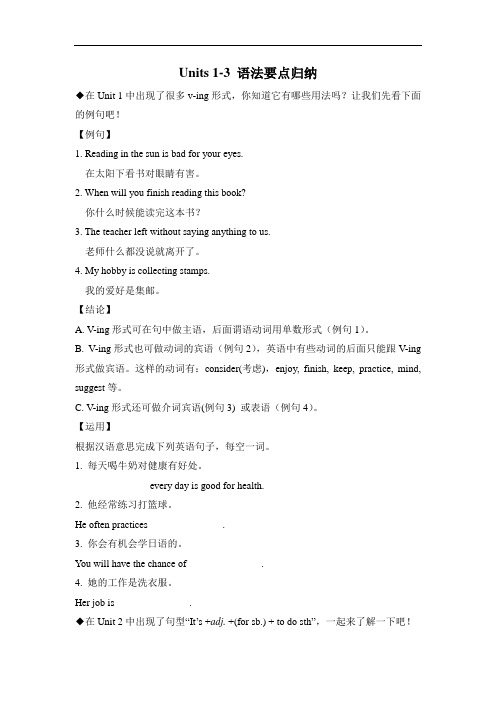
Units 1-3 语法要点归纳◆在Unit 1中出现了很多v-ing形式,你知道它有哪些用法吗?让我们先看下面的例句吧!【例句】1. Reading in the sun is bad for your eyes.在太阳下看书对眼睛有害。
2. When will you finish reading this book?你什么时候能读完这本书?3. The teacher left without saying anything to us.老师什么都没说就离开了。
4. My hobby is collecting stamps.我的爱好是集邮。
【结论】A. V-ing形式可在句中做主语,后面谓语动词用单数形式(例句1)。
B. V-ing形式也可做动词的宾语(例句2),英语中有些动词的后面只能跟V-ing 形式做宾语。
这样的动词有:consider(考虑),enjoy, finish, keep, practice, mind, suggest等。
C. V-ing形式还可做介词宾语(例句3) 或表语(例句4)。
【运用】根据汉语意思完成下列英语句子,每空一词。
1. 每天喝牛奶对健康有好处。
_______ _______ every day is good for health.2. 他经常练习打篮球。
He often practices _______ _______.3. 你会有机会学日语的。
You will have the chance of _______ _______.4. 她的工作是洗衣服。
Her job is _______ _______.◆在Unit 2中出现了句型“It’s +adj. +(for sb.) + to do sth”,一起来了解一下吧!【例句】It’s very important for parents to be there for their children.对于父母来说,始终和他们的孩子在一起是很重要的。
新目标英语九年级上第一单元知识点汇总
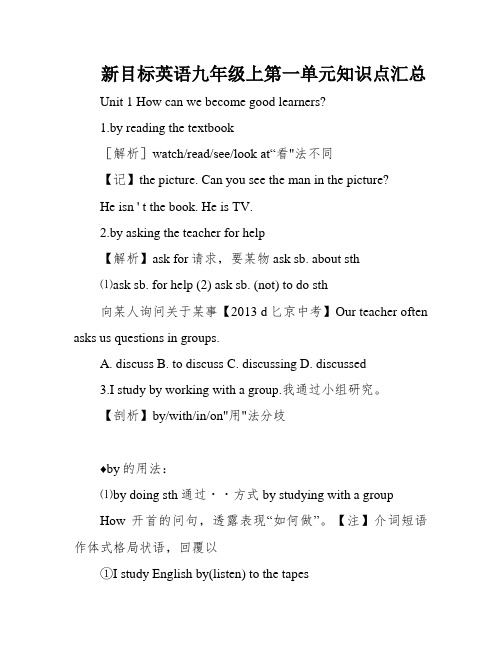
新目标英语九年级上第一单元知识点汇总Unit 1 How can we become good learners?1.by reading the textbook[解析]watch/read/see/look at“看"法不同【记】the picture. Can you see the man in the picture?He isn ' t the book. He is TV.2.by asking the teacher for help【解析】ask for请求,要某物ask sb. about sth⑴ask sb. for help (2) ask sb. (not) to do sth向某人询问关于某事【2013 d匕京中考】Our teacher often asks us questions in groups.A. discussB. to discussC. discussingD. discussed3.I study by working with a group.我通过小组研究。
【剖析】by/with/in/on"用"法分歧♦by的用法:⑴by doing sth通过・・方式by studying with a groupHow开首的问句,透露表现“如何做”。
【注】介词短语作体式格局状语,回覆以①I study English by(listen) to the tapes②Tom learns Chinese by(watch) Chinese movies.③--did you get there?- By a taxi.A. How; takingB. How ; takeC. How; tookD. What; taking(2) by+交通工具(交通工具前不能加限定词)♦with的用法:表示用某种工具⑴with +工具We like to write with a pen.(2)with+eyes.♦in的用法:平日与“穿着、声音、誊写资料”等称号连用in+语言in English用英语speak in a soft voice♦on的用法:on +电器或序言on TV /radio/Internet()The boy was cutting a branch of a tree a knife.A. inB. byC. withD. use4.Do you learn English by watching videos?by bike by train人体部位We see with our【解析】learn—learned/learnt—learned/learnt v研究learn about相识(1)learn from sb.(2)learn to do sth向某人研究学着做某事(3)learn…by oneself= teach oneself自学⑴aloud adv“出声",指出声能让人听见,但声音不大read aloud大声朗读(2) loud adj./adv作副词时,常与speak, talk, laugh等连用。
新目标英语九年级上第一单元知识点汇总

Unit1Howcanwebecomegoodlearners?1. by readingthetextbook【解析】watch/read/see/lookat “看〞法不同【】______thepicture.Canyouseethemaninthepicture?Heisn ’t________thebook.Heis______TV.2.byaskingtheteacherforhelp【解析】askfor 求,要某物asksb.aboutsth 向某人关于某事(1)asksb.forhelp (2)asksb.(not)todosth2021北京中考】Ourteacheroftenasksus_____questionsingroups.A.discussB.todiscussC.discussingD.discussedstudy byworking withagroup. 我通小学。
【解析】by/with/in/on “用〞法不同◆by的用法:(1)bydoingsth 通⋯方式bystudyingwithagroup【注】介短作方式状,答复以How开的句,表示“怎做〞。
IstudyEnglishby___________(listen)tothetapesTomlearnsChineseby____________(watch)Chinesemovies.③--____didyougetthere? —By___ataxi.A.How;takingB.How;takeC.How;tookD.What;taking(2)by+ 交通工具〔交通工具前不能加限定〕bybike bytrain◆with的用法:表示用某种工具(1)with+ 工具Weliketowritewithapen.(2)with+ 人体部位Weseewithour eyes.◆in的用法:通常与“衣着、声音、写材料〞等名称用in+言inEnglish 用英speakinasoftvoice◆on的用法:on+ 器或媒介onTV/radio/Internet()Theboywascuttingabranchofatree____aknife.A.inB.byC.withe4. Doyou learnEnglishbywatchingvideos?【解析】 learn →learned/learnt→learned/learntv学learnabout 了解(1)learnfromsb. 向某人学(2)learntodosth 学着做某事(3)learn ⋯byoneself=teachoneself 自学①Weshould_________________thehard-workingstudents.( 向⋯⋯学)5..aloud/loud/loudly(1)aloud adv “出声〞,指出声能人听,但声音不大readaloud 大声朗(2)loud adj./adv 作副,常与speak,talk,laugh 等用。
新目标人教版英语九年级1-3单元语法总结

Unit11.How do you study for a test? 回答:By+doing sth2.ask sb for help 向某人求助3.what about=how about怎么样?4.practice+sth/doing sth5.it+is +adj+(for sb)+to do sth 对某人来说做某事是怎么样的6.the best way to do sth 做某事的好方法7.ask sb about sth, ask sb to do sth, ask sb not to do sth 8.end up doing sth9.which ,who, what 等不定代词+v不定式结构10.forget+n/to do sth/doing sth11.why not do sth=why don’t you do sth 12.learn to do sth,13.decide to do sth, 14.first of all, 15.help sb do sth 16..look up, 17.worry about18.changge…into 19.with the help of sb 20.be angry at/about sth,be angry with sb21.regard…as 22.try one’s best pare…to 24.instead of sth/doing sthUnit2ed to +v原型,表示过去常常;否定形式为used not to /didn’t use to,疑问句形式为提used到句首,或在句首+did2.be used to +n/pron/v-ing 习惯于做某事3.be used to do sth/be used for doing sth被用来做某事4.I go to sleep (with my bedroom light on.)做伴随状语。
新目标九年级英语上册第一单元重点句子语法(精)

新目标九年级英语上册第一单元重点句子语法(精)第一篇:新目标九年级英语上册第一单元重点句子语法(精) 新目标九年级英语上册第一单元重点句子语法一:知识点1.Check in : 在旅馆的登记入住。
Check out: 在旅馆结账离开。
2.By: ①通过…..方式(途径。
例:I learn English by listening to tapes.②在…..旁边。
例:by the window/the door ③乘坐交通工具例:by bus/car ④在……之前,到……为止。
例:by October在10月前⑤被例:English is spoken by many people.3.how与what的区别: how 通常对方式或程度提问,意思有:怎么样如何,通常用来做状语、表语。
what通常对动作的发出者或接受者提问,意思为什么,通常做宾语,主语。
How is your s ummer holiday? It’s OK.(how表示程度做表语 How did you travel around the world? I travel by air.What do you learn at school? I learn English, math and many other subjects.4.aloud,loud ,loudly 均可做副词。
aloud 出声地大声地多与read、speak连用例如:read aloud 朗读speak aloud说出声来loud 大声地响亮地loudly 高声地多指喧闹声和不悦耳的声音。
5.voice 指人的嗓音也指鸟鸣。
sound 指人可以听到的各种声音。
noise 指噪音、吵闹声6.find + 宾语+ 宾补(名词形容词介词短语分词等例:I find him friendly.I found him working in the garden.We found him in bed.He found the window closed.7.常见的系动词有:①是:am、is、are ②保持:keep、stay ③转变:become、get、turn ④……起来feel、look、smell、taste、sound8.get + 宾语+ 宾补(形容词过去分词动词不定式使某种情况发生例:Get the shoes clean.把鞋擦干净Get Mr.Green to come.让格林先生进来I want to get my bike repaired.我想去修自行车You can’t get him waiting.你不能让他老等着 9.动词不定式做定语①与所修饰的名词构成主谓关系The next train to arrive was from New York.He is always thefi rst to come.②与所修饰的名词构成动宾关系I have nothing to say.I need a pen to write with.I need some paper to write on.I don’t have a room to live in.10.practice , fun 做名词为不可数名词11.add 补充说又说 12.join 加入某团体并成为其中一员attend 出席参加会议或讲座join in与take part in指参加到某项活动中去。
九年级英语一到三单元知识点

九年级英语一到三单元知识点Unit 1 How can we become good learners?一、重点单词。
1. textbook (n.) 教科书;课本。
2. conversation (n.) 交谈;谈话,常用于短语“have a conversation with sb.”(与某人交谈)3. aloud (adv.) 大声地;出声地。
区别于“loud”(adj. 大声的,常用来修饰名词,如a loud voice)和“loudly”(adv. 喧闹地,侧重于嘈杂、喧闹的声音)。
例如:Read aloud to practice pronunciation.(大声朗读来练习发音。
)4. pronunciation (n.) 发音;读音。
例如:His pronunciation is very good.(他的发音很好。
)5. sentence (n.) 句子。
6. patient (adj.) 有耐心的;n. 病人。
常用搭配“be patient with sb.”(对某人有耐心)。
例如:Our teacher is patient with us.(我们的老师对我们很有耐心。
)7. expression (n.) 表达(方式);表示;表情。
例如:Facial expressions can show our feelings.(面部表情能展示我们的情感。
)二、重点短语。
1. make word cards 制作单词卡片。
2. listen to tapes 听磁带。
3. ask the teacher for help 向老师求助。
4. read aloud 大声朗读。
5. have conversations with 与……交谈。
6. give a report 作报告。
7. word by word 逐字地。
8. the secret to... ……的秘诀。
例如:The secret to success is hard work.(成功的秘诀是努力工作。
人教版新目标英语九年级unit1单元知识点整理很实用

掌握本单元33个单词、49个常用短语、17个重点句子、12个常考点。
by介词的功能及by短语的划线提问以及if、unless 等引导的状语从句,what引导的宾语从句,whether 引导的主语从句,that引导的定语从句重点短语1.by doing sth2.by working with a group通过同小组一起学习3.by making word cards通过制作单词卡片4.by listening to tapes通过听录音磁带5.by asking sb for help通过向某人求助6.by watching videos/ English programs通过看录像/英文节目7.by listening to a tape and repeating out loud通过听录音和大声重复朗读8.by having conversations with friends通过和朋友一起会话9.by taking notes, doing exercises and reading a lot通过记笔记、做大量的练习和阅读10.by writing e-mails to my pen pals通过给笔友写电子邮件11.by reading books and newspapers 通过读书看报12.by speaking English with my classmates 通过和同学讲英语13.by memorizing sentence patterns 通过记句型14.by doing grammar exercises 通过做语法练习15.by reading English books/magazines. 通过阅读英文书籍和杂志16.by writing in an English diary 通过写英文日记17.by using an English dictionary 通过用英语字典18.have conversations with sb同某人谈话19.too...to..太...而不能...---so…that…/ enough to do sth 的转换20.give a report作报告21.at first起初22.word by word逐词地23.the secret to language learning 学习语言的秘诀24.be afraid to do sth害怕做某事=be afraid that+宾语从句be afraid of sth / doing sth 害怕…25.an English movie called Toy Story一部名叫《玩具故事》的英文电影26.fall in love with爱上...27.body language肢体语言28.as well也=too ;as well as 如同、和,连接主语时如同with(主谓一致要看前一主语,不能相加)29. a piece of cake小菜一碟;很容易的事30.It serves you right.活该,自作自受31.look up查阅;查找(主考点)32.so that以便;为了33.repeat out loud大声跟读34.sentence patterns句型35.spoken English英语口语36.make mistakes in doing sth 在...方面犯错37.the ability to do sth做某事的能力38.depend on视...而定;取决于;依靠39.pay attention to注意;关注40.connect...with... 把...和...连接或联系起来41.get bored感到厌烦42.try to do sth尽力做某事43.be stressed out焦虑不安的44.even if 即使45.think about 考虑;think of 想起;46.learn from 向……学习47.something new / interesting 新事物/有趣的东西48.be born with 天生具有49.Practice makes perfect.熟能生巧重点句子必背3. I want to learn new words and more grammar so that I canhave a better understanding of English movies. 为了对英语电影有更好的了解,我想学新单词和更多的语法。
人教新目标九年级英语-Unit 1全单元知识点解析

4. Don’t read word by word, read word groups. 不要逐字读, 要按意群来读。
word by word 逐字地, by表示某事渐渐发生。 类似短语有: day by day 一天天地
step by step 逐步地 one by one 一个接一个地 little by little 渐渐地
What / How about going to the zoo this afternoon? 今天下午去动物园怎么样?
aloud, loud & loudly
adv. 出声地; 大声地,侧重于“让人听得见” aloud 这一含义,并不一定指声音很大, 不用于比较
级
adv.大声地; 喧闹地,常指说话声和笑声,常 loud 与talk / speak / laugh / sing等词连用, 可用于比
The more I thought about it, the less I liked the idea. 我越想就越不喜欢这个主意。
【语境应用】根据汉语意思完成英语句子。 1) 你练习得越多, 就写得越好。
_T_h_e__m_o_r_e_ you practice, __th_e__b_e_tt_e_r_ you’ll write. 2) 他喝得越多, 就变得越兴奋。
It’s + adj.+ (for sb.) + to do sth. (对某人来说)做某事是……的
e.g.It’s too easy for her to answer the question. 对她来说回答这个问题太容易了。
【链接】 too ...to ...结构常表示“太……以致于不能……”, too后接形
新目标九年级英语Unit1知识点

新目标九年级英语Unit1知识点Unit 1 Knowledge Points in New Target Ninth Grade EnglishIntroduction:English is an important subject in our school curriculum. As we progress through our academic journey, we encounter different units and topics that contribute to our overall language development. In the ninth grade, one such unit is Unit 1, which covers a range of knowledge points that are essential for our linguistic growth. In this article, we will explore these knowledge points and their significance in our English learning.1. Vocabulary Expansion:A key aspect of Unit 1 is expanding our vocabulary. By learning new words and phrases, we can enhance our ability to express ourselves accurately and precisely. The unit introduces us to a variety of words related to school life, such as "term," "assignment," "extracurricular," and "diligent." It not only aids us in understanding the text but also helps us when engaging in conversations and writing assignments.2. Grammar:Grammar is the backbone of any language, and Unit 1 focuses on reinforcing our understanding of grammar rules. The unit emphasizes the usage of simple present tense, present continuous tense, and simple past tense. These tenses are crucial as they enable us to convey actions, states, and events in a coherent and grammatically correct manner. By practicing these tenses, we can refine our writing and speaking skills.3. Reading Comprehension:Unit 1 incorporates reading comprehension exercises that develop our ability to understand and interpret written texts. By engaging with a variety of reading materials, such as news articles, advertisements, and short stories, we improve our reading speed, comprehension, and critical thinking skills. This not only allows us to succeed in English exams but also enhances our overall knowledge base.4. Listening Skills:Listening skills play a vital role in effective communication. Unit 1 introduces us to different listening exercises, such as dialogues, interviews, and presentations. By actively listening and understanding the spoken language, we become more proficient in interpreting aural information. Additionally, these exercises help us improve our pronunciation and word recognition skills.5. Speaking Practice:Unit 1 encourages active participation in spoken English. Through group discussions, role plays, and presentations, we gain the confidence to express our thoughts and opinions. This fosters an environment of inclusivity and encourages us to articulate our ideas fluently and coherently. Speaking practice enhances our interpersonal skills and prepares us for future endeavors.6. Writing Skills:Unit 1 focuses on enhancing our writing skills by introducing various writing formats, such as emails, formal letters, and personal narratives. Through practice, we learn to structure our thoughts, employ appropriate vocabulary, and follow the conventions of different writing forms. These skills are essential for effective communication and enable us to express ourselves clearly and persuasively.Conclusion:Unit 1 in the ninth-grade English curriculum is an important milestone in our language learning journey. By expanding our vocabulary, strengthening our grammar, improving our reading and listening abilities, practicing speaking, and refining our writing skills, we develop a well-rounded proficiency in English. Mastering these knowledge points not only helps us excel academically but also lays astrong foundation for future language acquisition and communication. Let us embrace the challenges and opportunities presented by Unit 1 and continue to strive for excellence in our English language skills.。
九年级英语1至3知识点

九年级英语1至3知识点1. 语法知识点在九年级英语中,学生将进一步巩固和扩展所学的语法知识。
以下是一些重要的语法知识点:主谓一致:主语与谓语在人称和数上要保持一致。
例如:He likes to play basketball.(他喜欢打篮球。
)动词时态:学生需要学会运用时态,包括一般现在时、一般过去时、一般将来时等。
例如:She is studying for the exam.(她正在备考。
)被动语态:学生需要理解被动语态的构成和使用,例如:The book was written by a famous author. (这本书是由一位著名的作者写的。
)比较级和最高级:学生需要掌握形容词和副词的比较级和最高级形式的构成和使用。
例如:This book is more interesting than that one.(这本书比那本书更有趣。
)条件句:学生需要学会使用条件句表达假设和结果之间的关系。
例如:If I have time, I will go shopping.(如果我有时间,我将去购物。
)名词性从句:学生需要了解名词性从句的用法和结构,例如:I know that he is a doctor.(我知道他是个医生。
)2. 词汇知识点除了掌握基本的词汇外,九年级学生还需要学习一些更高级的词汇和短语。
形容词和副词:学生需要扩展词汇量,掌握更多形容词和副词的用法。
例如:beautiful, amazing, carefully, quickly等。
介词短语:学生需要学会运用介词短语来描述位置、时间和方式等。
例如:in front of, at the end of, by bus等。
固定搭配和习惯用语:学生需要学会一些常用的固定搭配和习惯用语,以丰富表达能力。
例如:take care, on the other hand, as a matter of fact等。
3. 阅读技巧在九年级英语中,学生将接触到更多的阅读材料,因此需要掌握一些阅读技巧。
九年级英语U1-3重点知识梳理
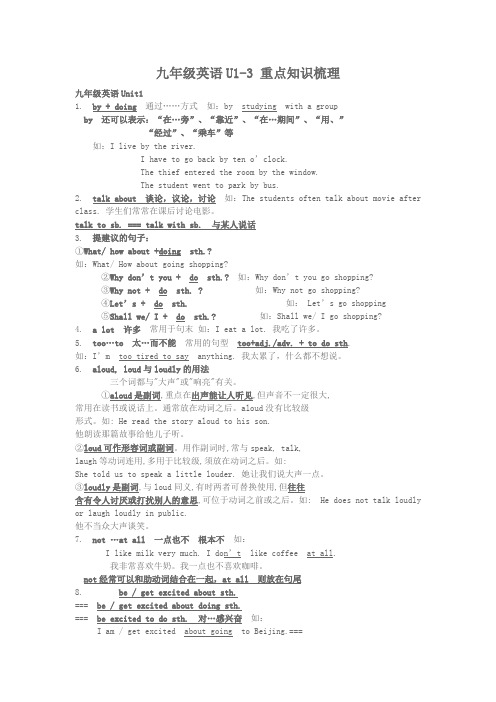
九年级英语U1-3 重点知识梳理九年级英语Unit11. by + doing通过……方式如:by studying with a groupby 还可以表示:“在…旁”、“靠近”、“在…期间”、“用、”“经过”、“乘车”等如:I live by the river.I have to go back by ten o’clock.The thief entered the room by the window.The student went to park by bus.2. talk about 谈论,议论,讨论如:The students often talk about movie after class. 学生们常常在课后讨论电影。
talk to sb. === talk with sb. 与某人说话3. 提建议的句子:①What/ how about +doing sth.?如:What/ How about going shopping?②Why don’t you + do sth.?如:Why don’t you go shopping?③Why not + do sth. ? 如:Why not go shopping?④Let’s + do sth. 如: Let’s go shopping⑤Shall we/ I + do sth.?如:Shall we/ I go shopping?4. a lot 许多常用于句末如:I eat a lot. 我吃了许多。
5. too…to 太…而不能常用的句型too+adj./adv. + to do sth.如:I’m too tired to say anything. 我太累了,什么都不想说。
6. aloud, loud与loudly的用法三个词都与"大声"或"响亮"有关。
①aloud是副词,重点在出声能让人听见,但声音不一定很大,常用在读书或说话上。
- 1、下载文档前请自行甄别文档内容的完整性,平台不提供额外的编辑、内容补充、找答案等附加服务。
- 2、"仅部分预览"的文档,不可在线预览部分如存在完整性等问题,可反馈申请退款(可完整预览的文档不适用该条件!)。
- 3、如文档侵犯您的权益,请联系客服反馈,我们会尽快为您处理(人工客服工作时间:9:00-18:30)。
【拓展】感叹句 【句型一】 What + (a / an) + 形容词 + 名词 + 主语 + 谓语! What a clever boy he is! (他是个)多么聪明的男孩啊! What an interesting story it is! (这是个)多么有趣的故事啊! What fine weather it is! 多好的天气啊!
你学会了吗?
B 1. ____ a nice watch it is! A. How B. What C. What a D. How a
C 2. _____ fools they were! They believed what the girls said. A. How C. What B. How an D. What an
What do you think of this book? =How do you like this book?
I don’t know what I should do with the matter. =I don’t know how I should deal with it. I don’t know what to do next step? =I don’t know how to do it next step?
②Why don’t you + do sth.? ③Why not + do sth. ? ④Let’s + do sth. ⑤Shall we/ I + do sth.? Why don’t you go shopping? Why not go shopping? Let’s go shopping Shall we/ I go shopping?
Unit 1-3
How do you study for a test ?
吕文佳 cherry
1
U1-1:课文中重点词汇短语及拓展
2
U1-2:中考常考词汇辨析
3
U1-3:how引导特殊疑问句及句法拓展
1. How do you study for a test?你怎样学习,准备应考?通过听录音。 I study by listening to tapes. How 表示 “方式方法” How do you usually go to school ? I go to school by bus. He makes a living by working on the farm.
What beautiful flowers they are! (它们是)多么漂亮的花啊!
【句型二】 How + 形容词 / 副词 + 主语 + 谓语!
How well you look! 你气色真好!
How kind you are! 你心肠真好! How beautifully you sing! 你唱得真好听! How clever the boy is! 这个男孩多么聪明啊!
A 3. ____ cheap these clothes are! I’d like to buy some for my son. A. How C. What B. How an D. What an
3.提建议的句子:
①What/ how about +doing sth.? What/ How about going shopping?
巧解感叹句: 基本结构:
1)What+名词+陈述肯定式:
2)How+形容词(或副词)+陈述肯定式 ①____cold water this is! A.How ②____cold it is! A.What B.How B.What
记住下面歌诀更方便 what,how如何选? 先在后面把名词找, 若有名词用what, 若无名词必用how。
2.how与what的区别 how通常对方式或程度提问,意思有怎么样 ,如何。 what通常对动作的发出者或接受者提问。 ①How is your summer holiday? It’s OK.(how表示程度 做表语)
②How did you travel around the world? I travel by air.
Thank you!
③What do you learn at school? I learn English, Math and many other subjects.
What…think of…? = How…like…? What…do with…? =How…deal with…? What to do?= How to do it?
本节内容: 1.特殊疑问词how/ what 区别 2.感叹句基本结构 What+名词+陈述肯定式 How+形容词(或副词)+陈述肯定ห้องสมุดไป่ตู้ 3.表示提建议的句子
“I am Sorry”
某人刻苦学习英语,终有小成。 一日上街不慎与一老外相撞,
忙说:I am sorry.
老外应道:I am sorry too. 某人听后又道:I am sorry three. 老外不解,问:What are you sorry for? 某人无奈,道:I am sorry five.
